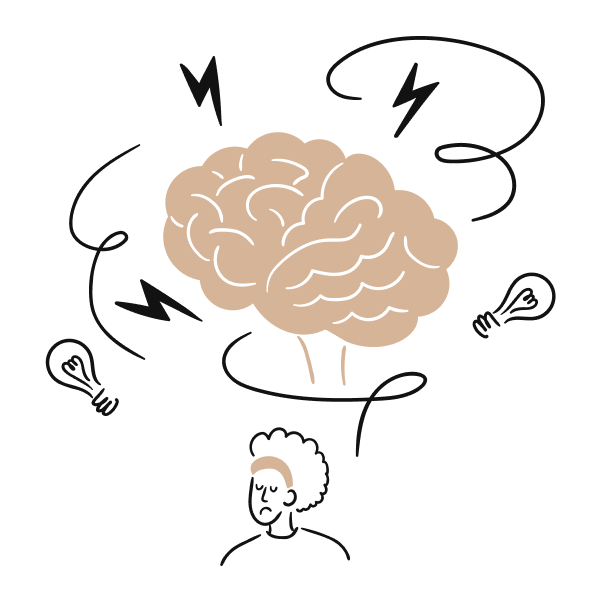If the fear of being seriously ill or becoming ill dominates your daily life, you may have a illness anxiety disorder (formerly hypochondria).You notices every physical sensation, leading to brooding thoughts.
What is it?
Early signals
If you have illness anxiety, you may experience the following:
- You are afraid of being sick or getting sick;
- You may “think” yourself sick or think you are sick;
- You are on average very anxious about your overall health;
- You are mindful of having a serious illness more often than usual;
- You may be convinced that you actually have an illness;
- You have certain behaviors out of fear for your health, for example, over-checking your body;
- You pay more attention to your body and notice much more; This increases the credibility that there really is something wrong with you.
- You experience physical feelings as threatening and you attribute them to an illness;
- You may also be imagining a pain.
What are physical and psychological symptoms?
The anxiety associated with fear of illness may be accompanied by the following symptoms:
- Palpitations;
- Sweating;
- Dizziness;
- Shortness of breath;
- Fatigue;
- Stress;
- Sadness;
- Gloomy mood;
- Panic symptoms;
- Specific physical symptoms.
How illness anxiety affects your behavior
- Care-seeking type. In this case, you exhibit control behavior. This means that you actually put more effort into caring.
- Care-avoiding type. In this case you exhibit avoidance behavior. This means that you shift your attention to everything except caregiving.
What do you do as the care-seeking type?
Examples of control behaviors include:
- You go to the doctor more often to seek reassurance.
- You check your body a lot for physical symptoms of illness.
- You search a lot for reassurance, for example on the Internet; which is often counterproductive.
- You like to read up as much as possible.
What do you do as the care-avoiding type?
Examples of avoidance behaviors are:
- You prefer not to talk about medical topics because it makes you anxious.
- You avoid certain situations that trigger anxiety, such as the hospital.
- You actually go to the doctor less often to avoid healthcare appointments.
- You may avoid physical exercise, for fear of a heart attack.
Illness anxiety can be a constant fear that always affects you, but in some people it comes and goes with periods.
Illness anxiety as part of depression
Illness anxiety can also occur as part of depression. Physical and psychological conditions affect each other. This is called comorbidity, and for anxiety disorders and depression, you are more likely to have both. Research shows that two-thirds of individuals with depression also have an anxiety disorder. Conversely, nearly 60 percent of persons with an anxiety disorder also suffer from depression.
What causes fear of illness?
Illness anxiety often develops in young adulthood. Much is unclear about its cause. There are several factors involved, for example:
- Major life events;
- Prolonged stress;
- A serious illness during childhood;
- A previously experienced serious health threat (that ended well);
- A history of child abuse;
- Incorrect beliefs or little knowledge about bodily sensations sometimes also play a role;
- Heredity and your upbringing: what did you get from your parents and your environment about illness and health?
Impact on daily life
Illness anxiety disorder hinders you considerably in your daily life. Because of your fears and the belief that you are sick, you are restricted in your functioning. This possibly causes a decline in your quality of life.
Limited ability to function due to illness anxiety can lead to;
- Disappointing performance at your work due to sick leave;
- Increased tension in your relationship and family life;
- Constant worries and frustrations
- Constantly suffering from tension.
- Excessive reassurance seeking due to unnecessary care consumption. This in turn leads to high healthcare costs;
- Late reaction to an actual condition in care avoidance;
- Possible depression.
What can you do?
Are you experiencing symptoms yourself? Then try one of the tips below:
- Reduce excessive control of your body. Try to shift your focus as much as possible;
- Also reduce the constant search for possible explanations for physical sensations you have;
- Reduce excessive visiting the doctor to get reassurance;
- Find situations that make you anxious. This helps to get over the anxiety.
The above tips are easier said than done. Beliefs and behaviors are often deeply ingrained. Are you unable to modify your behavior and master the fear yourself? Then know that you can always seek help from a psychologist.
Tips for dealing with hypochondriac partner
Can’t work it out with your partner? The following advice will help you and your partner with illness anxiety:
- Don’t keep reassuring your partner with fear of illness all the time. That often doesn’t work.
- Find distractions together. Go do something fun with your partner to shift your thoughts to something else.
- Your partner can get worked up easily. So try not to be too strict and try to listen.
- Take the step together to seek professional help.
Is illness anxiety disorder treatable?
Illness anxiety is treatable, if you get the right guidance for it. The following forms of therapy are used for disease anxiety disorder;
- Cognitive behavioral therapy (CBT)
Cognitive behavioral therapy (CBT) is the most effective treatment for disease anxiety disorder. Treatment focuses on reducing anxious thoughts and assumptions. You do this by challenging these thoughts with your psychologist. - Exposure Therapy
During treatment, you will also work with exposure, where you face fearful situations anyway. And work is done on reducing control and safety behaviors. The idea is that you discover that your disaster thoughts do not come true if you enter into a fearful situation or let go of some form of control or safety behavior. - ACT.
Acceptance and commitment therapy (ACT) is a treatment that helps you deal with your problem in a different way: in this case, the fear of disease. - EMDR.
EMDR is used in the treatment of trauma and is applied when a traumatic event has contributed to the development of illness anxiety. - Mindfulness
Through mindfulness therapy, you learn to be more in the here and now. This allows you to look at your thoughts from a distance. You learn to choose where you focus your attention, so you get less caught up in thoughts and feelings that are triggered from fear. This allows you to refocus more on things you find valuable in your life, and it helps you cope better with anxiety.
Medication
In some cases, medication is also used. For example, when the fear of illness is accompanied by a panic disorder. Medication just does not address the cause. iPractice does not use medication, and in the case of cognitive behavioral therapy, we do not recommend using medication.
Help with illness anxiety disorder
Do you have questions about illness anxiety disorder? Or do you have doubts about when to consult a psychologist?
-
Have you tried many things yourself and still experiencing symptoms? Feel free to call us at 085-1308900 or contact us online. This way you can feel if there is a click and if you feel comfortable.
-
At iPractice, you will work with 2 psychologists. Treatment consists of both online contact and regular consultation room sessions at one of iPractice’s locations. Or find out more information about the intake and treatment process at iPractice.
-
Cognitive behavioral therapy (CBT) is the first choice of treatment for illness anxiety disorder. A treatment lasts on average 4 to 6 months.
-
With a referral letter from the general practitioner and an official diagnosis according to DSM-5 guidelines, almost every insurer will reimburse the cost. See which health insurance companies reimburse our care.
-
Read Maria’s personal story about her illness anxiety disorder and how treatment at iPractice helped her in recovery. Or read more experience stories in anxiety disorders.


 Nederlands
Nederlands




